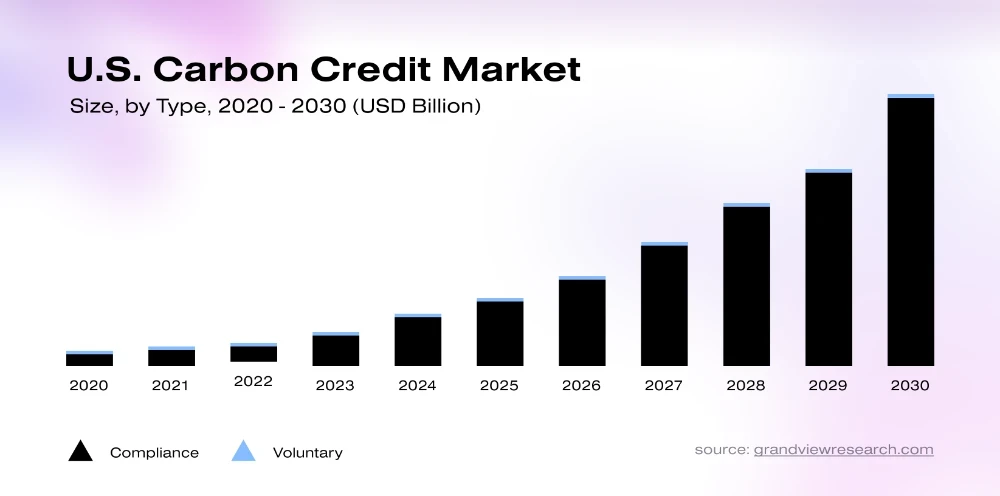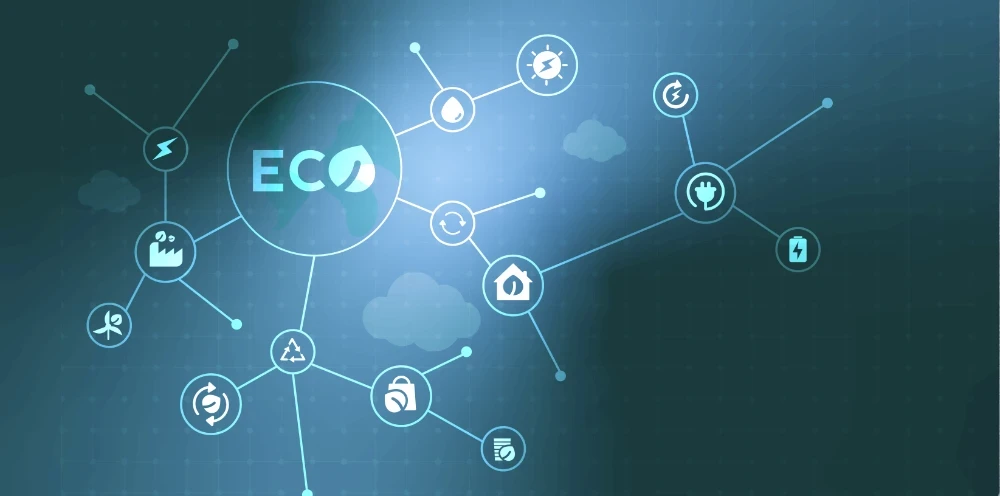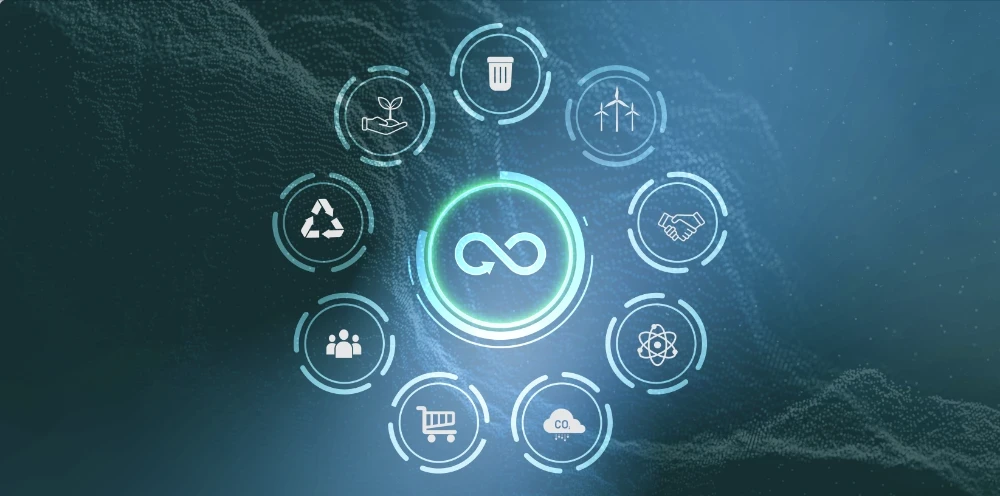Blockchain in Carbon Credits - About the Green Economy
Marketing, Technology 8 min reading
Content
Show- Understanding Carbon Credits and Their Role in Business
-
What Can Blockchain Do in the Carbon Credits Market?
- Asset Tokenization: Simplifying Carbon Credit Ownership
- Digitize the Data: Enhancing Transparency and Efficiency
- Efficient Carbon Offset Trading: Streamlining Transactions with Smart Contracts
-
Use cases of Blockchain in Carbon Credits
- Sunified: Real-Time Data for Profitable Solar Decisions
- KlimaDAO: Boosting Carbon Offset Prices through Tokenization
- dClimate.net: Decentralized Network for Climate Data
- Ways Blockchain Reduces Carbon Emissions
- EU Steps for Blockchain and Climate Action
- Conclusion
Explore more from Velas

Technology 1 min reading
Velas Expands Cross-Chain Bridging to AvalancheExciting news for the Velas community! We're thrilled to announce that Velas has extended its cross-chain interoperability by enabling bridging to Avalanche, a prominent blockchain platform known for its high throughput and low fees.

Technology, Engineering 1 min reading
Smart Contracts on SteroidsWelcome to the latest edition in our series, Exploring Velas' Innovative Technologies. Throughout this series, we delve into the cutting-edge technologies propelling Velas forward as a leading blockchain platform, reshaping the landscape...


Understanding Carbon Credits and Their Role in Business
In today's rapidly evolving business landscape, combating climate change has become a priority for many organizations. One powerful tool in the fight against carbon emissions is the concept of carbon credits. Carbon credits are a tradable form of environmental currency that represent the reduction or removal of one metric ton of carbon dioxide (CO2) or its equivalent in greenhouse gas emissions.
Businesses can acquire carbon credits by investing in projects that reduce emissions, such as renewable energy installations, energy efficiency initiatives, or reforestation efforts. These credits serve as a mechanism to offset their own carbon footprint, allowing them to demonstrate environmental responsibility and contribute to global climate goals.
The global carbon credit market has experienced remarkable growth, reflecting the increasing demand for sustainable solutions. In 2022, the market size reached a substantial value of USD 364.03 billion. Experts predict that the market will continue to expand at a rapid pace, with a projected compound annual growth rate (CAGR) of 38.7% from 2023 to 2030. This growth can be attributed to various factors, including the implementation of government policies and regulations aimed at curbing greenhouse gas emissions.

What Can Blockchain Do in the Carbon Credits Market?
While carbon credits present an opportunity for businesses to contribute to sustainability, the market faces several challenges. These challenges include complexity in verifying and tracking carbon credit ownership, lack of transparency, and difficulties in trading and settling transactions efficiently. This is where blockchain technology emerges as a promising solution.
Blockchain's decentralized and immutable nature can revolutionize the carbon credits market. It offers transparency, security, and efficiency, solving critical issues and driving the transition to a greener economy. Several companies are already embracing blockchain to increase transparency and streamline processes in the carbon credits market.
Farkhad Shagulyamov, CEO of Velas, a leading blockchain platform, believes in the transformative potential of blockchain in the carbon credits market. He states,
“Blockchain technology provides a transparent and immutable ledger, enabling secure and efficient transactions. It has the power to address the challenges faced by businesses and governments in managing carbon credits, leading to greater accountability and widespread adoption.”
These sentiments are echoed by other companies like Toucan, Return, Open Forest Protocol, and dClimate, which are leveraging blockchain to enhance transparency and make the carbon credits market more accessible.
Go green with Velas Blockchain! Seamlessly integrate blockchain technology into your sustainability efforts and make a significant impact on reducing carbon emissions. Join the movement towards a greener future. Choose Velas Blockchain today!

Asset Tokenization: Simplifying Carbon Credit Ownership
One significant problem in the carbon credit industry is the complexity of verifying and tracking ownership. Blockchain technology enables the tokenization of carbon credits, converting them into digital assets represented on the blockchain. This allows for seamless tracking and authentication of ownership, ensuring transparency and reducing the risk of fraud.
Digitize the Data: Enhancing Transparency and Efficiency
In addition to simplifying ownership, blockchain can revolutionize the way carbon credit data is managed. By digitizing the data and utilizing an open data infrastructure, blockchain ensures quick and transparent access to relevant information.
Blockchain's distributed ledger system enables real-time data verification, facilitating accurate tracking and reporting of carbon emissions reductions. This transparency creates trust among stakeholders and streamlines compliance processes, ultimately driving greater participation in the carbon credits market.
Efficient Carbon Offset Trading: Streamlining Transactions with Smart Contracts
Blockchain's smart contract capabilities open up new possibilities in carbon offset trading. Smart contracts are self-executing agreements that automatically trigger actions when predefined conditions are met. In the context of carbon credits, smart contracts can automate the entire trading process, from verification to settlement, eliminating intermediaries and reducing transaction costs.
Shagulyamov emphasizes the benefits, stating,
“Smart contracts simplify and accelerate carbon offset trading. They enable secure and instant settlement, removing the need for intermediaries. This efficiency fosters liquidity in the market and encourages broader engagement.”
However, not all industry players are convinced about the widespread adoption of blockchain in the carbon credits market. An anonymous competitor challenges the notion, suggesting that "while blockchain shows promise, it still faces scalability and regulatory hurdles that need to be addressed. Its potential impact on the market should be carefully assessed before fully embracing it."
Use cases of Blockchain in Carbon Credits
As the carbon credits market gains momentum, businesses are seeking innovative solutions to enhance transparency and efficiency. Blockchain technology has emerged as a promising tool to address the challenges faced by stakeholders in the carbon credits industry. By leveraging blockchain, companies are revolutionizing the way carbon credits are managed, traded, and monitored. In this section, we explore three compelling use cases that highlight the transformative power of blockchain in the carbon credits market.
Sunified: Real-Time Data for Profitable Solar Decisions
One of the critical challenges in the solar energy sector is obtaining real-time data from photovoltaic (PV) panels. Sunified, a pioneering company in the field, recognizes the need for minute-by-minute visibility into each PV panel's performance. By harnessing blockchain technology, Sunified enables stakeholders such as operators, financiers, and insurers to make profitable decisions based on high-fidelity, real-time data.
KlimaDAO: Boosting Carbon Offset Prices through Tokenization
KlimaDAO is an ambitious project that combines the common crypto carbon model of tokenized carbon offsets with the principles of a Decentralized Autonomous Organization (DAO). By purchasing carbon offsets, tokenizing them, and influencing the market, KlimaDAO aims to increase the price of offsets on the voluntary carbon market (VCM).
What sets KlimaDAO apart is its vision to become a carbon-backed currency. KLIMA tokens, backed by reserve holdings in Basic Carbon Tonne (BCT) tokens issued by Toucan, are designed to serve as a medium of exchange. The DAO structure allows KLIMA token holders to participate in governance, proposing and voting on measures to shape the project's direction.
dClimate.net: Decentralized Network for Climate Data
In the era of climate change, reliable access to climate data is crucial for businesses and builders aiming to understand the impact of weather and climate on communities. dClimate.net, the first decentralized network for climate data, aims to provide a comprehensive ecosystem for accessing and utilizing essential climate information.
Built on Polygon, a carbon-negative Ethereum scaling platform, dClimate leverages Chainlink's decentralized oracle network for on-chain data validation and governance support. Through dClimate, businesses and governments can access institutional-grade climate data, enabling the creation of climate risk tools and applications.
While blockchain technology holds tremendous potential in the carbon credits market, anonymous competitors caution that scalability and regulatory challenges must be carefully considered before widespread adoption.

Ways Blockchain Reduces Carbon Emissions
Blockchain technology holds tremendous potential for reducing carbon emissions and promoting sustainability. By leveraging blockchain in the carbon credits market, the following specific benefits can be realized:
- Transparency and Traceability: Blockchain enables accurate, reliable, and easily accessible data on carbon emissions. It promotes transparency throughout the supply chain, allowing stakeholders to track and report reductions in greenhouse gas emissions.
- Real-Time Analysis and Verification: Blockchain facilitates real-time analysis and verification of carbon footprint reductions. This ensures that data is accurate, trustworthy, and up-to-date, enabling more informed decision-making.
- Efficient Carbon Offset Trading: Blockchain simplifies and accelerates credit trading by providing a decentralized platform for securely exchanging carbon credits. Smart contracts on the blockchain automate and streamline the process, reducing administrative burdens and increasing efficiency.
- Open Data Infrastructure: Blockchain's distributed ledger technology can digitize and securely store data related to carbon credits. This enables quick access, data sharing, and transparency, enhancing collaboration among stakeholders and facilitating the development of innovative solutions.
EU Steps for Blockchain and Climate Action
The European Union (EU) recognizes the potential of blockchain in addressing climate change and has taken significant steps to support its implementation. The EU's initiatives include:
- Encouraging Development and Use: The EU actively promotes the development and use of blockchain technology as a means to overcome climate challenges and motivate individuals and businesses to reduce their carbon footprint.
- Technical Support and Investment Strategies: The EU provides technical support and investment strategies to enable the use of blockchain-based digital technologies for climate change mitigation and adaptation. This support fosters innovation and encourages the adoption of blockchain solutions.
- Partnerships and Collaboration: The EU establishes partnerships with key stakeholders, including international financial institutions, to foster collaboration and leverage collective expertise in addressing climate action. These partnerships strengthen the ecosystem and ensure the effective implementation of blockchain-based solutions.
Conclusion
The carbon credits market is undergoing a transformative phase with the integration of blockchain technology. The inherent characteristics of blockchain, such as transparency, traceability, and efficiency, make it a promising tool for reducing carbon emissions and driving the transition to a greener economy.
Blockchain enhances the credibility and accountability of carbon credits by providing a tamper-resistant and immutable ledger. It enables real-time data analysis, verification, and trading, streamlining processes and promoting transparency throughout the supply chain.
As businesses and governments increasingly prioritize sustainability, embracing blockchain for carbon credits becomes imperative. Velas Blockchain, led by CEO Farkhad Shagulyamov, stands as a leading innovator in this space,
“Velas Blockchain offers a robust and scalable solution that leverages blockchain's transformative potential to drive positive change in the carbon credits market. Our platform empowers stakeholders with the tools they need to make sustainable investments and contribute to a greener future.”
Leveraging Velas Blockchain as a solution for integrating blockchain technology into your green business can be the right decision. Velas Blockchain offers the tools and infrastructure necessary to effectively manage carbon credits, reduce carbon emissions, and promote sustainability. Take the next step towards creating a greener future by harnessing the power of Velas Blockchain for your business needs.
Stay ahead of the curve
Add your email to get hand-tailored messages only. We say no to boring newsletters and spam!



